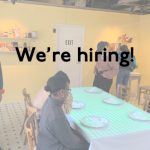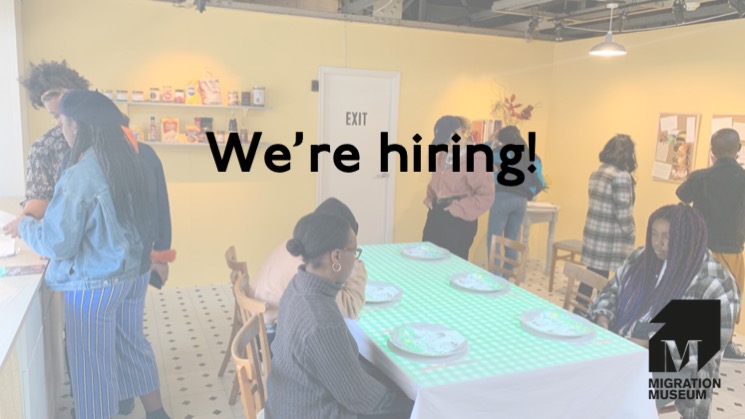29 January, 2020
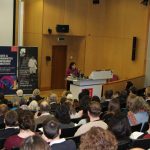
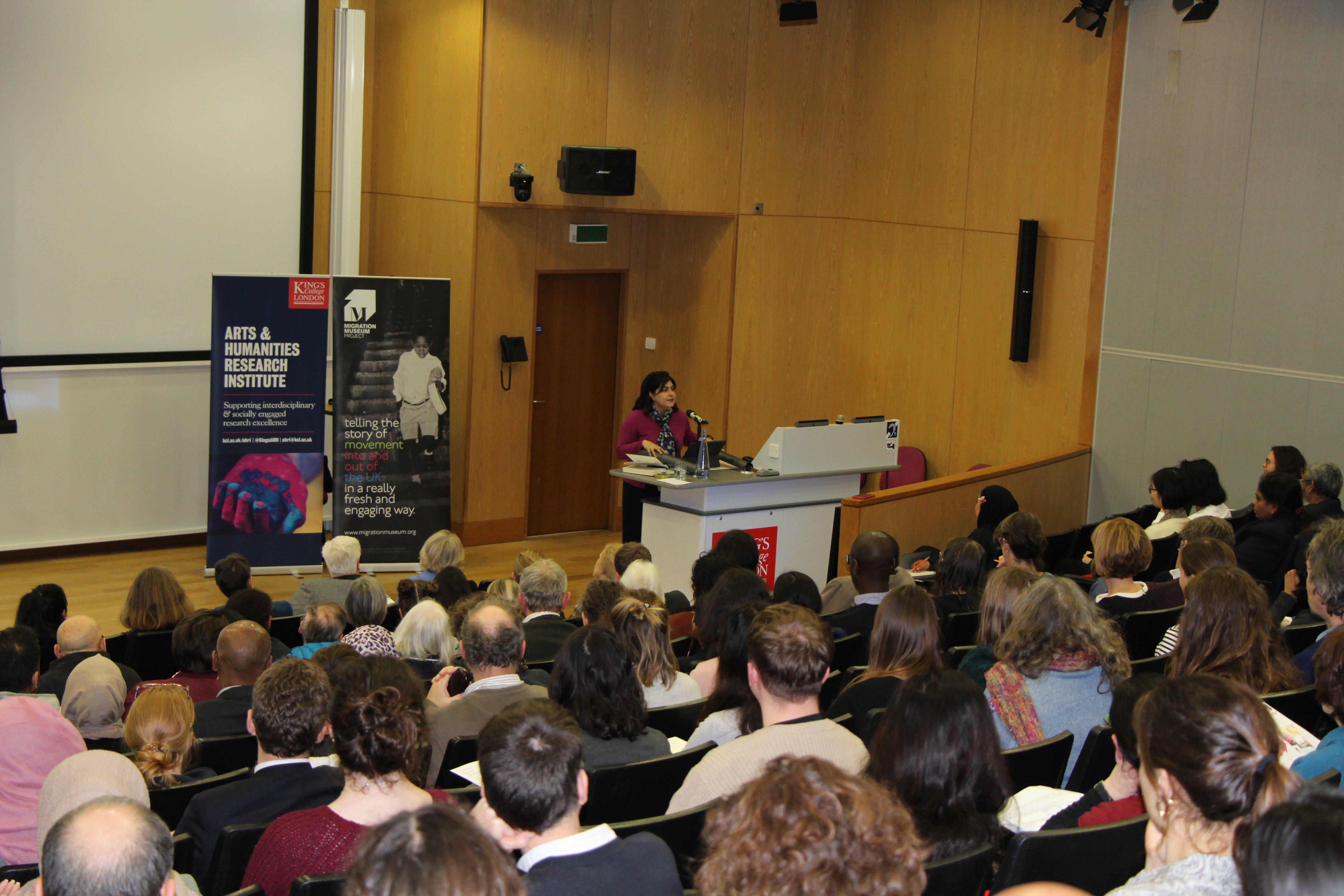
All images © Ana-Maria Militaru
It’s safe to say that the Migration Museum lectures don’t disappoint: all have been thought-provoking and inspiring in equal measure, from Michael Rosen’s lecture on ‘The Languages of Migration’ in 2014 to David Olusoga’s ‘The Perils of our Insular Illusion’ in 2018.
But the lecture that Baroness Sayeeda Warsi gave on Tuesday 21 January at King’s College London was a bit special – particularly because it was introduced and chaired by her friend, Baroness Shami Chakrabarti, who has spoken eloquently about their cross-bench friendship previously, referring to Sayeeda Warsi as her ‘naughty little sister’. From her introduction to the lecture to the interview that followed it, there was a political friendship on display that was affectionate but challenging, exploring differences, questioning positions – in essence, a representation of what Baroness Warsi was saying that the UK itself needed right now.
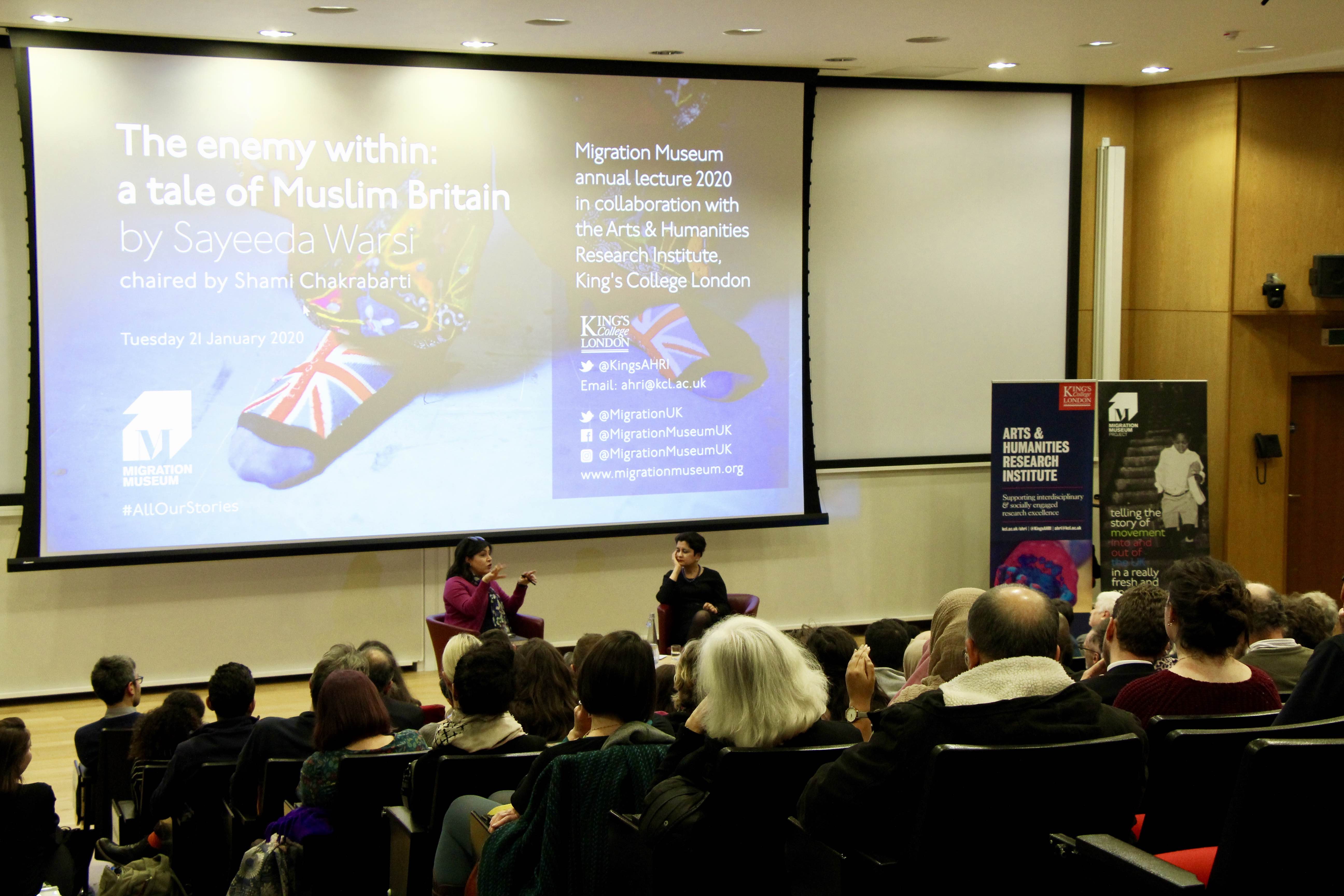
Sayeeda Warsi’s lecture explored the rise of Islamophobia and described the challenge of navigating complex currents of religion, identity and allegiance as a British Muslim and a high-profile politician in her talk. But, because, for her, migration was all about stories, ‘stories that make up who we are as Britain’, there were also stories, mostly about her family, who, as she said, had been British for 150 years – both her grandfather and her great-grandfather having fought ‘for’ Britain in the two world wars of the 20th century.
In a wide-ranging and thought-provoking lecture, based in part on her best-selling book, The Enemy Within, Baroness Warsi started by posing four provocative questions for the audience:
- Whose country is Britain?
- Which migrants are/were acceptable, and which are not?
- Who has the right to belong?
- Why are the children of migrants always told to be grateful?
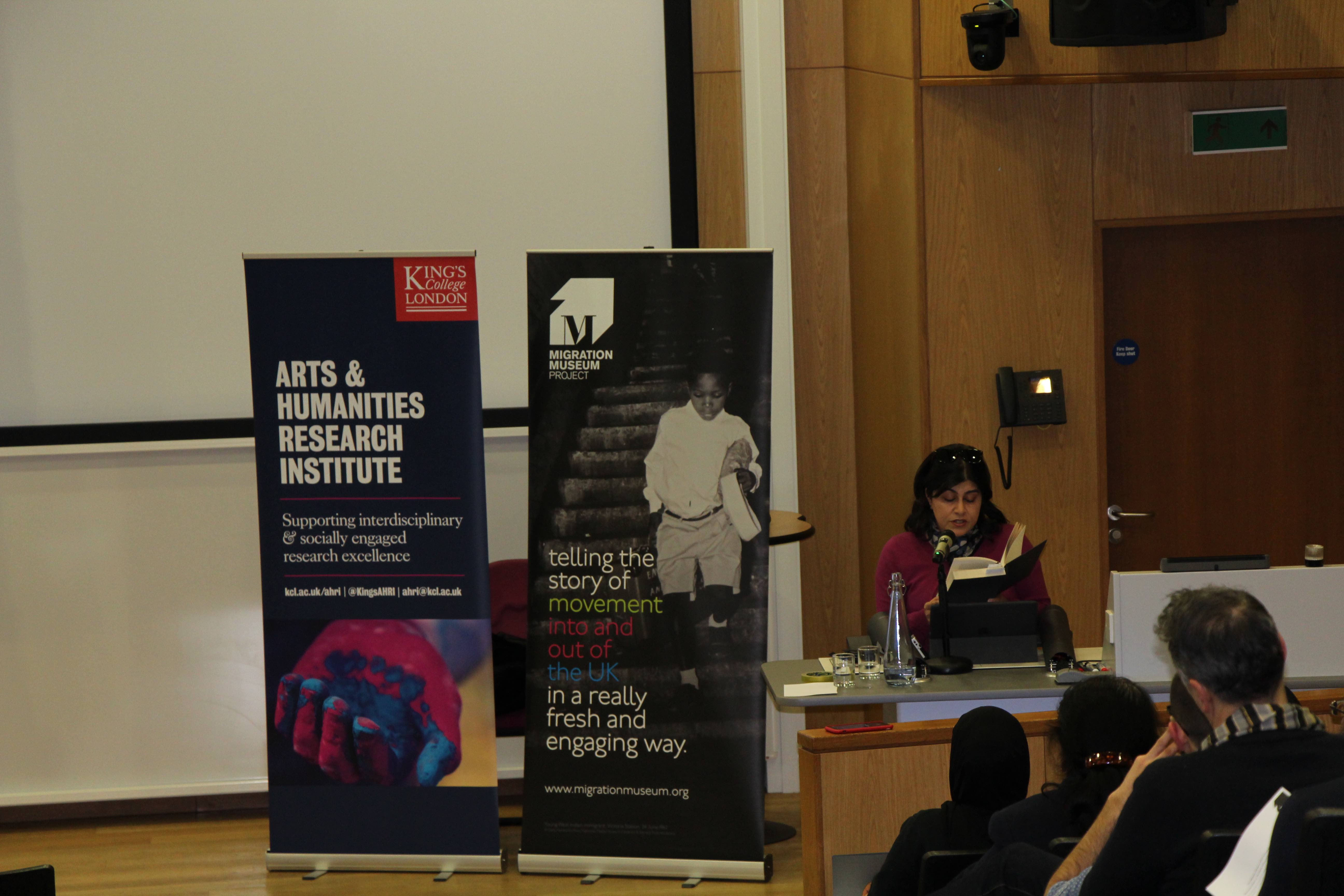
As part of her response to these questions, she recounted her mother’s keenness to buy a house in Pakistan, ‘for when they kick us out of here’ – a position that Baroness Warsi at the time thought was absurd. After all, who was this ‘they’? And who were ‘we’? And wasn’t the situation in Britain getting better by the year, and Enoch Powell becoming increasingly a distant memory of a bygone age?
Over the last few years, however, Baroness Warsi had come to understand her mother’s position more and more. In the course of the 2016 referendum – for which, as she explained in the talk, she had been an early supporter of the Leave campaign before stepping down, worried at what she called its xenophobia – immigration, never far from the number one spot in most papers’ headlines, took up a fixed position there for the next year or two. And, of course, what many voters meant by immigration was essentially (if erroneously) Muslim immigration.
In an atmosphere of anxiety and apprehension at the drift in public discourse towards intolerance and incivility, Baroness Warsi remained cautiously optimistic. Migration was about stories, she said, and the more people heard these stories, the less able they were to demonise the migrants involved; similarly, nothing was likely to defeat Islamophobia and racism more than the simple matter of people living alongside each other and forming relationships (there was silent applause from all Migration Museum members at this point!). And Britain itself was a work in progress, as it always has been. People who think its identity is static, fixed and determined are just not facing up to historical reality – the country and its identity have been constantly evolving, and always will. Look, for example, she said, at the difference between Margaret Thatcher’s promotion of the infamous Section 28 (which banned the ‘promotion’ of homosexuality, or the promotion of ‘the acceptability of homosexuality’, in schools) and David Cameron’s government in 2010, which legalised same-sex marriages.
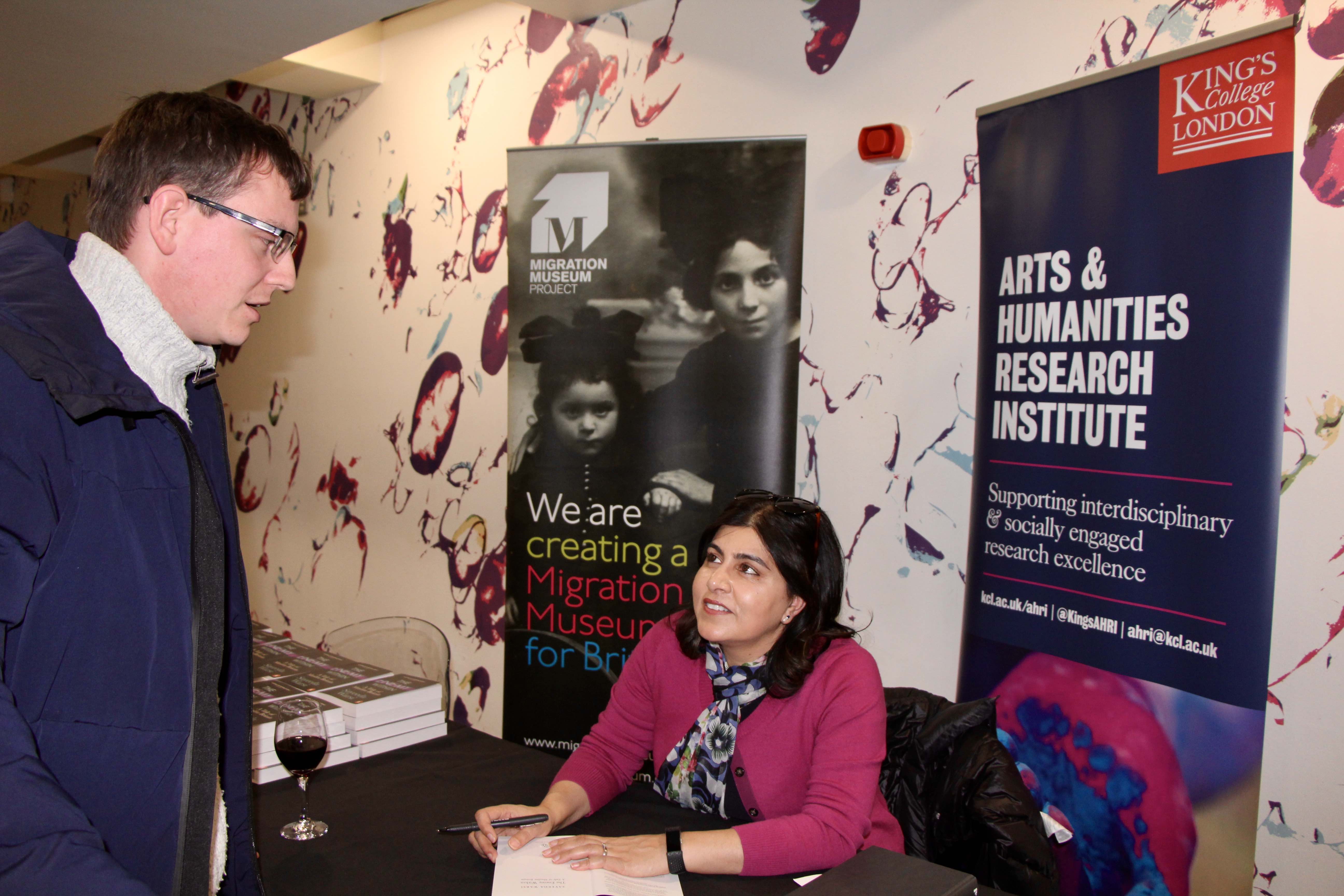
Things had to change, of course. Baroness Warsi suggested that Muslim communities needed to be more active in their exposition of Islam and not wait for an incident such as a terrorist attack before denouncing such behaviour as contradictory to their religion. And Britain as a whole needed to recognise that ‘diversity’ was not people of different skin tones holding exactly the same opinions as their ‘white’ colleagues – real diversity was an acceptance of difference, a challenging of different positions, and a movement onwards, propelled by those differences. The affectionate and respectful way in which Baroness Warsi and Baroness Chakrabarti challenged each other’s positions was itself an expression of the diversity Baroness Warsi was calling for.
The lecture was also a celebration of a new partnership between King’s College London’s Arts and Humanities Research Institute and the Migration Museum, and Professor Anna Reading and Dr Leonie Ansems de Vries gave short talks about the academic research being undertaken into migrant studies.
The 300 or so attendees traipsed out into the grey, gloomy Tuesday evening afterwards with a little nugget of hope.
Baroness Warsi’s Migration Museum lecture, ‘The Enemy Within: A Tale of Muslim Britain’ will be available as a downloadable audio-file shortly. Other Migration Museum lectures are available to listen to/watch and download from our website.
22 January, 2020
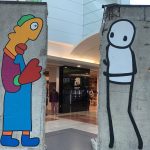
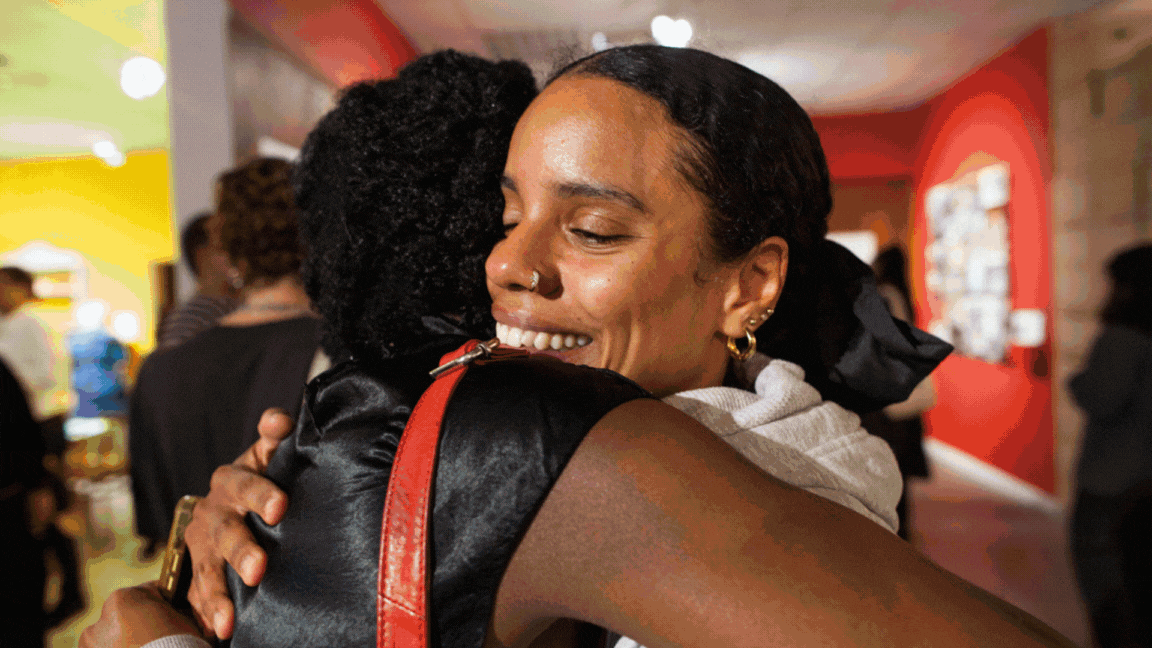
The Migration Museum in Lewisham has now closed. Thank you to everyone who visited us during our five wonderful years in Lewisham.
We are opening in our new permanent home in the City of London in 2028 and while we do not currently have a venue open to the public, we are continuing to offer community and learning outreach and external walking tours and events as we prepare to open our permanent home in 2028.
Visit the What’s On section of our website to see upcoming external events and
Sign up to our mailing list to be the first to hear about upcoming external events and outreach and our progress on our journey to create Britain’s missing museum.
Come with us
Come with us on the next stage of our journey as we work towards the opening of our permanent home in the City of London:
⭐ Connect with us: Sign up to our mailing list and follow us on Instagram, Facebook, LinkedIn, BlueSky and TikTok to stay connected, hear about our upcoming external events and outreach, get behind-the-scenes insights into our work and plans, deeper dives into the artists and makers we work with, and be the first to hear what’s next.
⭐ Spread the word: Tell your friends, families and colleagues about the Museum and our work.
⭐ ‘Visit’ us online: You can engage with our work online via our Heart of the Nation: Migration and the Making of the NHS online exhibition, our Taking Care of Business: Migrant Entrepreneurs and the Making of Britain online exhibition, our 100 Images of Migration online gallery, and our Departures: 400 Years of Emigration from Britain podcast.
⭐ Donate: Making a one-off gift, or a regular commitment through a monthly contribution, will enable us to continue our work and build the momentum of the museum.
School, college and university outreach
We do not currently have a venue open to the public, so we are unable to host in-person school trips. In the meantime our award-winning learning team is continuing their work through outreach, assemblies, online visits and walking tours.
Please get in touch with our Learning Manager Tia (tia@migrationmuseum.org) to enquire about booking a learning engagement. We deliver workshops for Upper Key Stage 2 – Key Stage 5, as well as talks for university students. To support your lessons, you can also explore our online learning resources on our resource bank and sign up to our Learning Mailing List to stay up to date with our latest learning events and resources.
Partner with us
Planning a festival or large community event? We can bring stories, activities, and displays that celebrate migration and get people talking. We especially want to connect in Lewisham, Tower Hamlets, the City, and nearby boroughs. Interested? Get in touch at mona@migrationmuseum.org.
Book a private walking tour
Discover the migration stories woven into London’s streets with your team or group. It’s a great way to spark meaningful conversations and share your own migration stories. Learn more here or email partnerships@migrationmuseum.com with your group size and preferred dates – and we’ll get back to you to arrange your tour.
For more information, please email us at info@migrationmuseum.org or call us on 020 3488 4508 (please note that calls will only be answered during working hours).
11 December, 2019
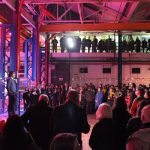
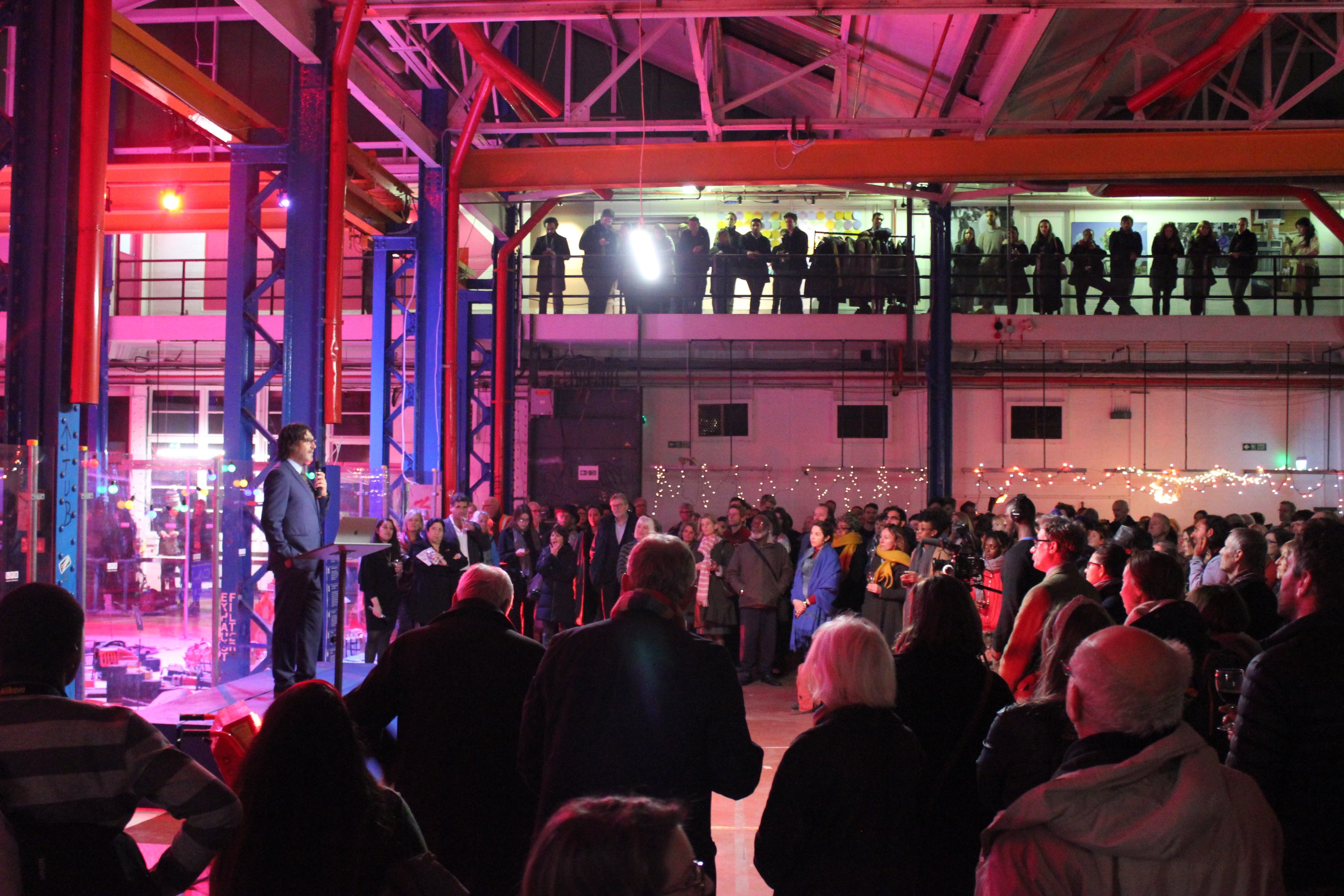
Historian, TV presenter and Migration Museum trustee David Olusoga speaking at the launch of our Room to Breathe exhibition, October 2018 © Poppy Williams/Migration Museum
After a fantastic two and a half years, our Migration Museum at The Workshop is now closed to the public.
As we gear up for a move to an exciting new venue in 2020 – more details coming soon – we wanted to look back at some of the highlights of our time on Lambeth High Street.
Being based at The Workshop since April 2017 has been transformative for us as an organisation, providing us with a venue of our own for the very first time. We have staged a dynamic series of exhibitions, events, and education and group workshops, and significantly grown our audience, profile and partnerships, testing ideas, gathering feedback and providing a showcase for the permanent Migration Museum for Britain that we are working to create.
During our time at The Workshop, we:
Welcomed over 32,000 visitors from across London, the UK and beyond.
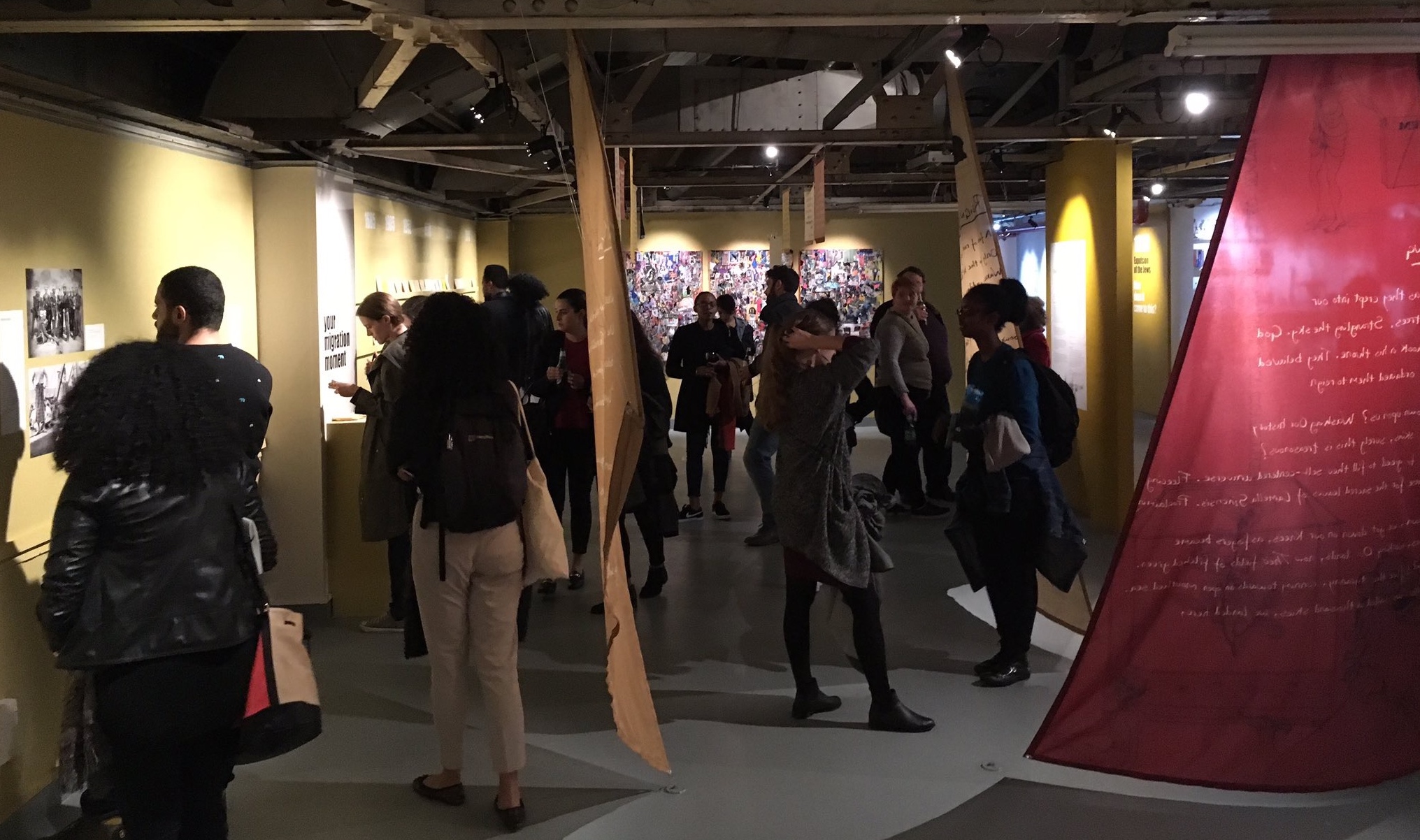
Visitors to a late opening at the Migration Museum at The Workshop © Migration Museum
Staged three major exhibitions:
Call Me By My Name: Stories from Calais and Beyond, a multimedia exhibition exploring the complexity and human stories behind the current migration crisis, with a particular focus on the now demolished Calais camp.
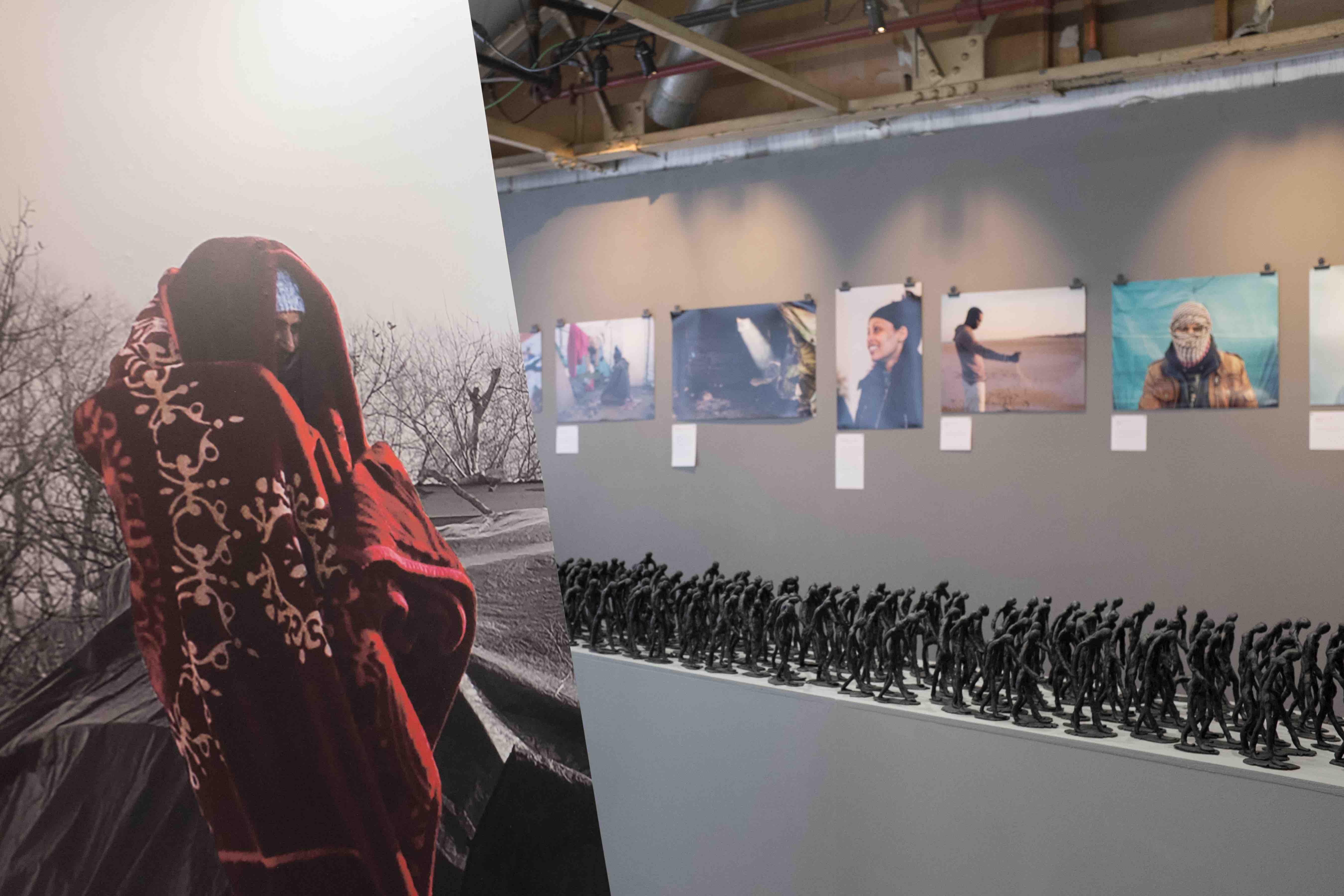
Call Me By My Name: Stories from Calais and Beyond at the Migration Museum at The Workshop, April 2017 © Kajal Nisha Patel
No Turning Back: Seven Migration Moments that Changed Britain, an acclaimed exhibition exploring seven migration moments throughout history that changed Britain through art, photography, graphics, quotes and stories.
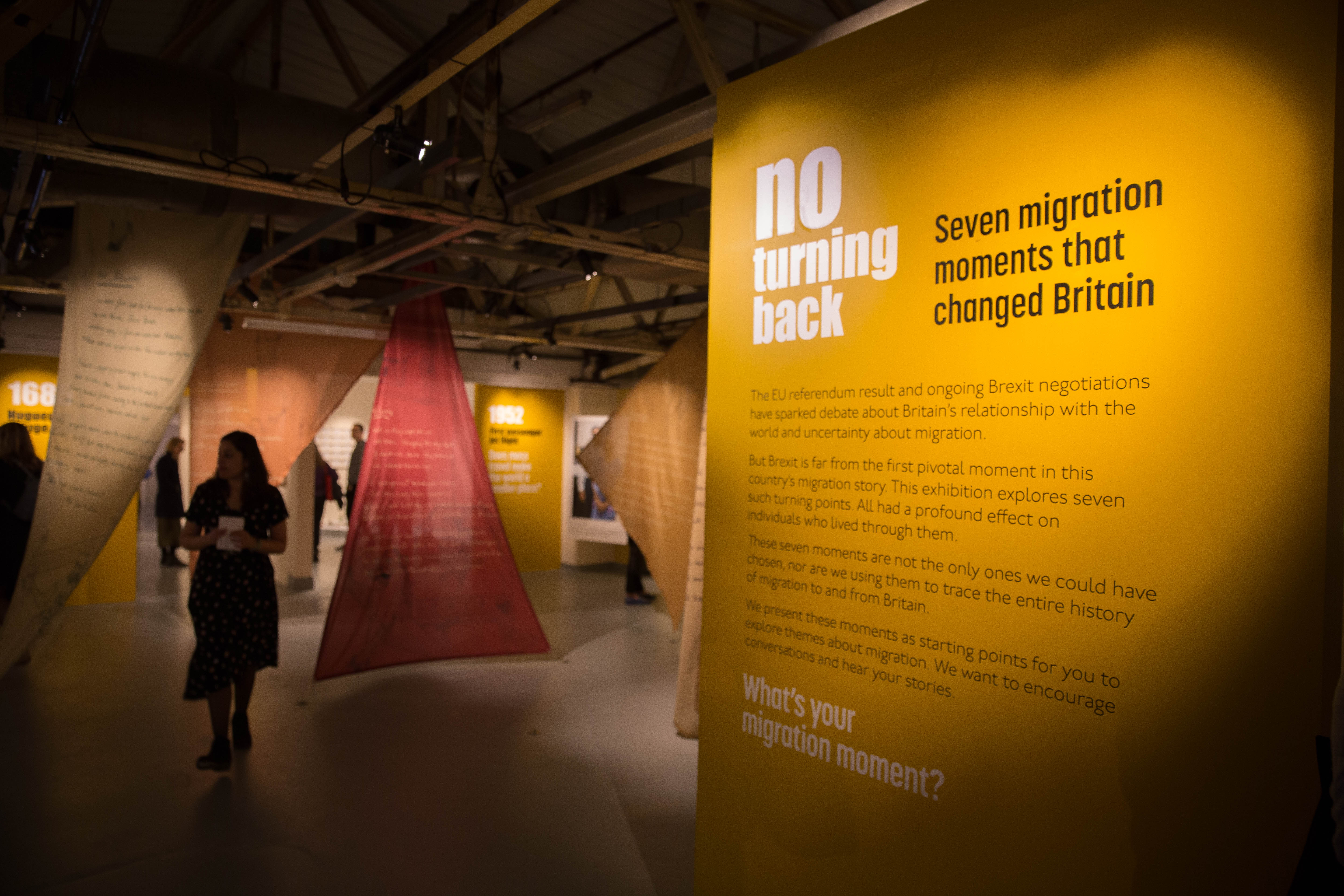
No Turning Back: Seven Migration Moments that Changed Britain at the Migration Museum at The Workshop, November 2018 © Migration Museum
Room to Breathe, an immersive exhibition inviting visitors to discover personal stories from generations of new arrivals to Britain by journeying through a series of interactive rooms in which the struggles, joys, creativity and resilience of living in a new land are brought to life through audio, films, photographs and personal objects.
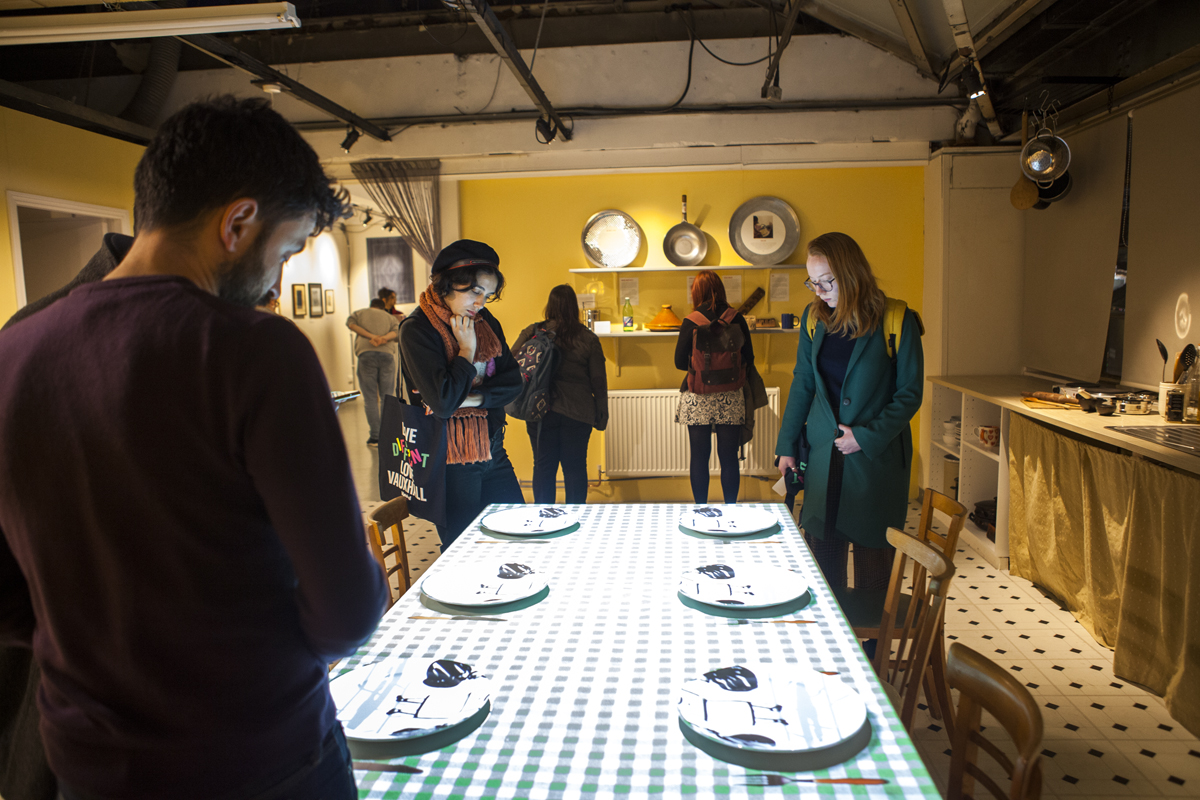
Room to Breathe at the Migration Museum at The Workshop © Elzbieta Piakacz/Migration Museum
The exhibition included an art studio, curated by visual artist and educator Dima Karout, which hosted a different migrant artist in residence each month who made the studio their own, creating art and sharing their work and process with visitors in real time. This programme culminated in Borderless, a group show curated by Dima Karout and featuring all of the artists who had taken up residency in the art studio during the exhibition run.
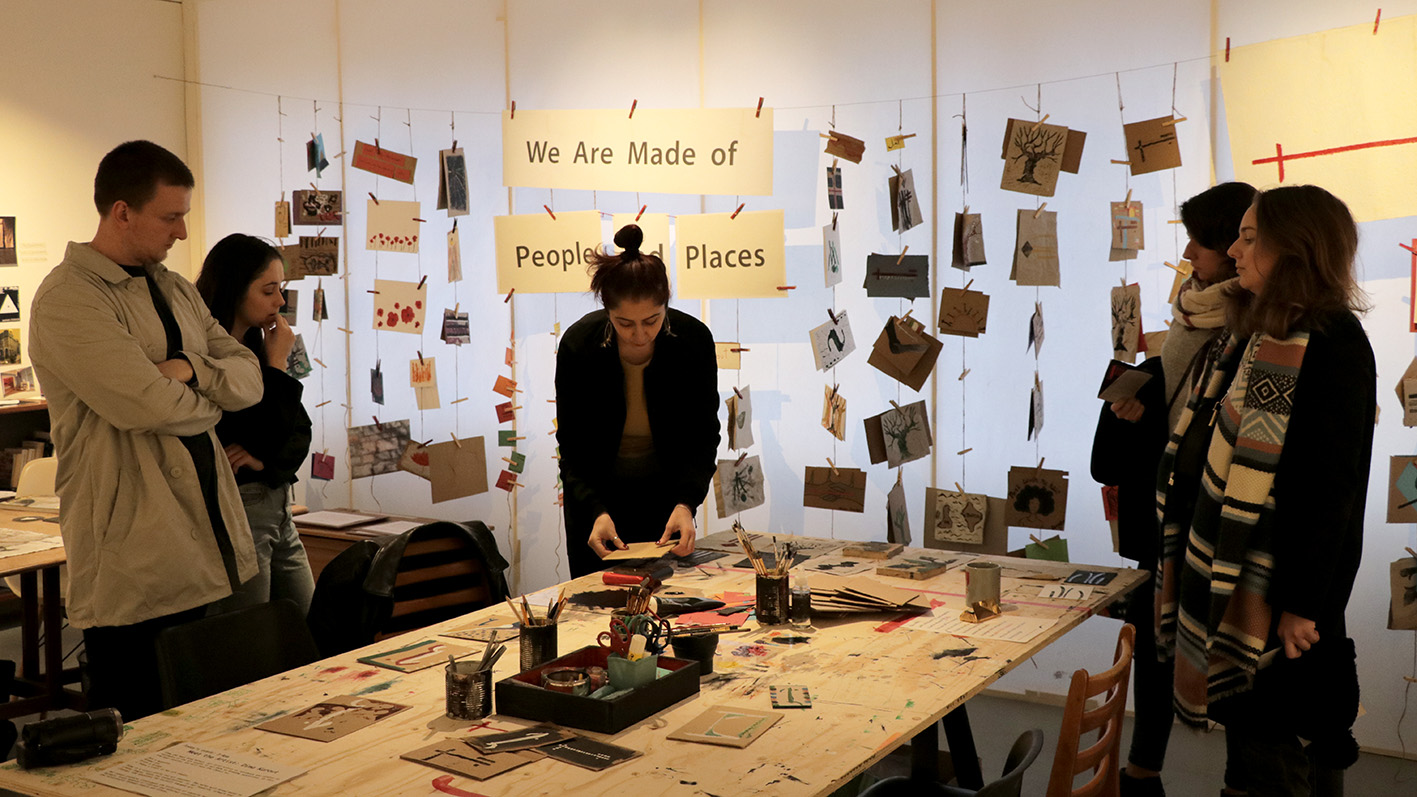
Visual artist and educator Dima Karout leads an art workshop in the art studio in Room to Breathe © Migration Museum
Hosted a regularly changing series of pop-up and temporary exhibitions, including:
The New Londoners, a series of family portraits by Magnum photographer Chris Steele-Perkins documenting London’s unique cultural richness
Caribbean Takeaway Takeover, an interactive pop-up art and sound installation showcasing the stories of Windrush generation elders by artist EVEWRIGHT
Nowhere People UK, a selection of works by UN documentary photographer Greg Constantine, commissioned and presented by UNHCR, exploring the impact of statelessness on individuals in the UK
A Mile in My Shoes – Migration, an immersive experience by the Empathy Museum housed in a giant shoebox inviting visitors to walk a mile in the shoes – literally – of refugees and migrants who have made London home while listening to their story.
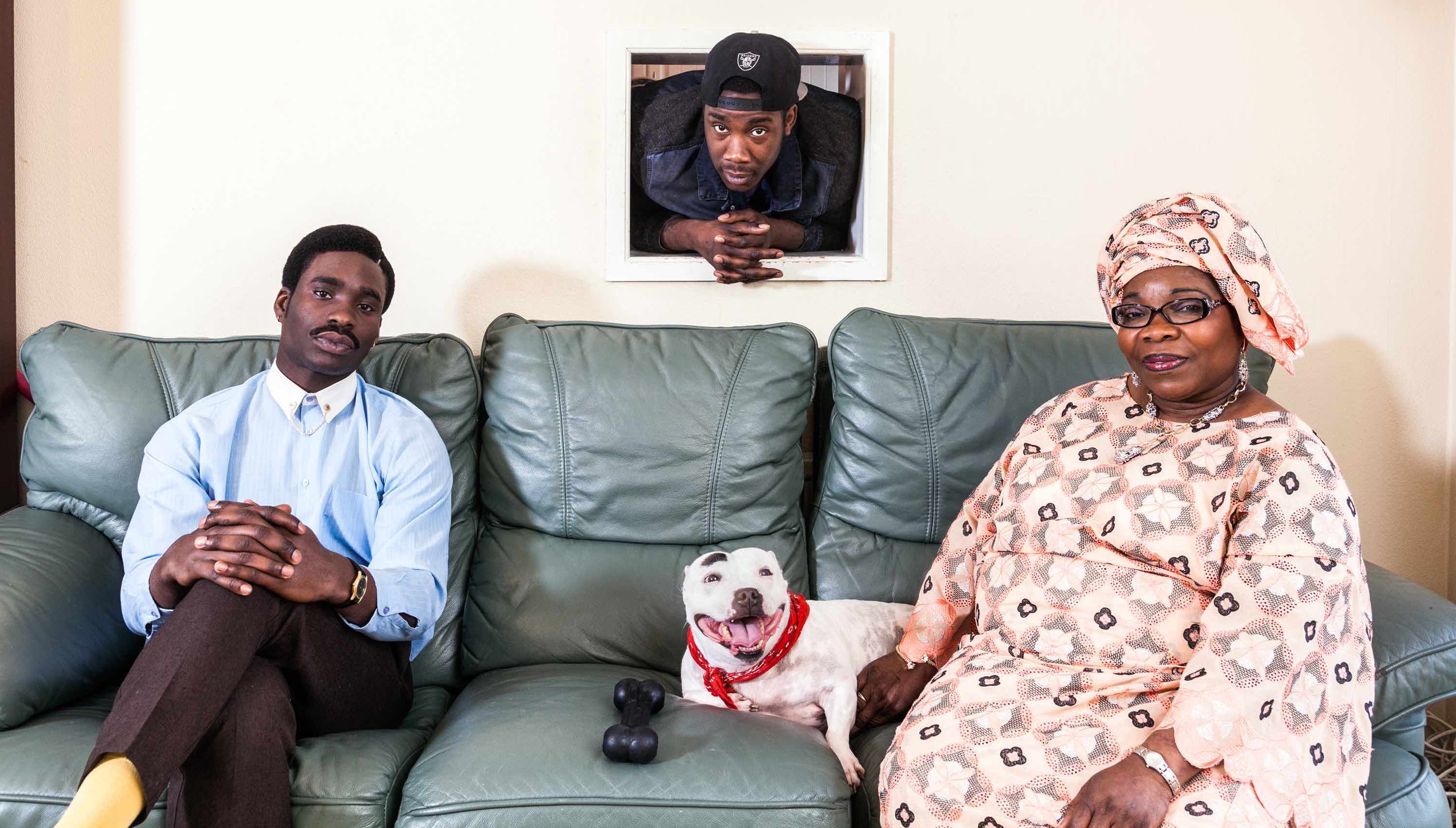
Nigeria – Joe Ogunmokun, his mother Adebimpe Ogunmokun and brother Michael Ogunmokun, from The New Londoners by Chris Steele-Perkins © Chris Steele-Perkins
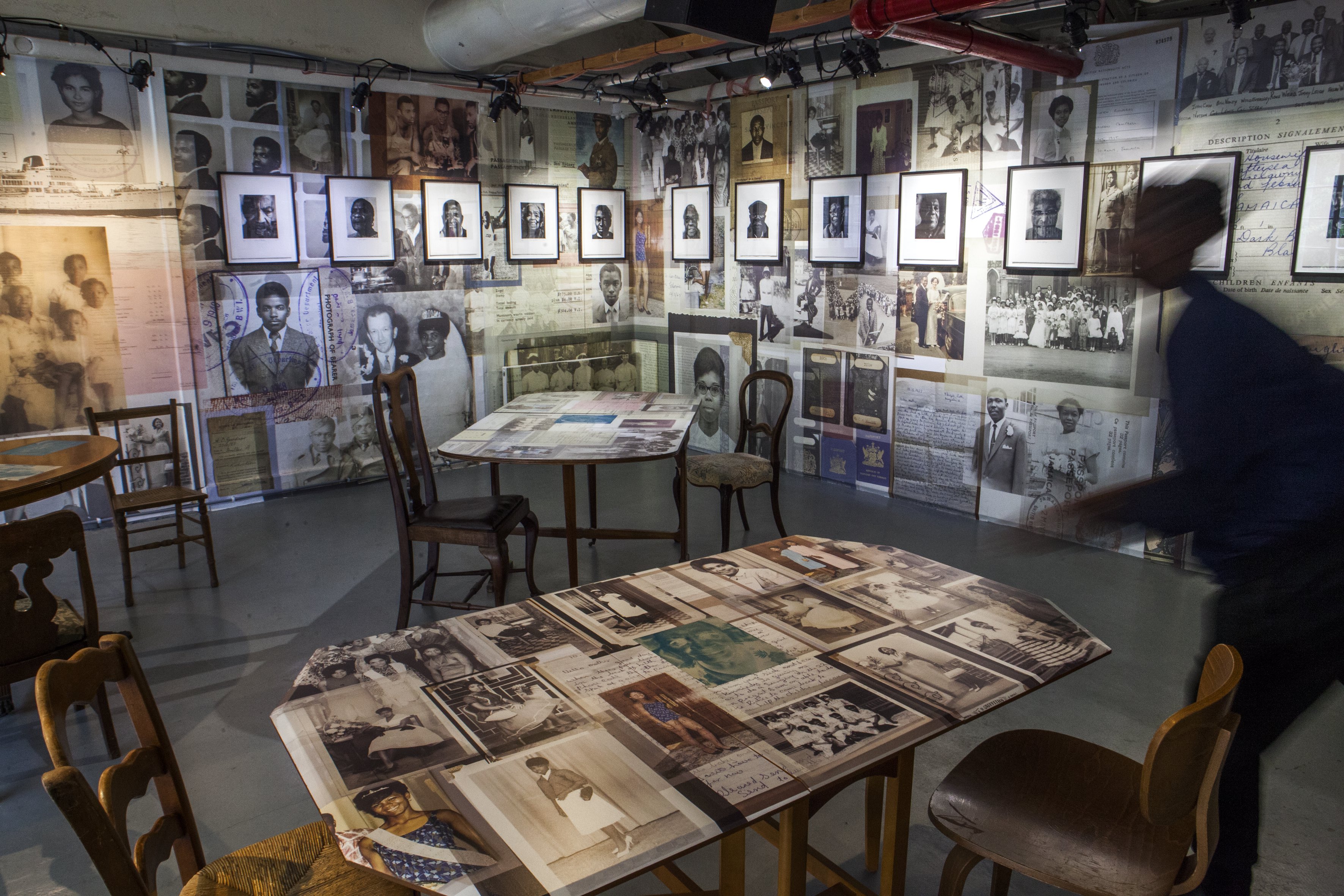
Caribbean Takeaway Takeover: Identities and Stories at the Migration Museum at The Workshop, May 2019 © Elzbieta Piakacz/EVEWRIGHT Studio
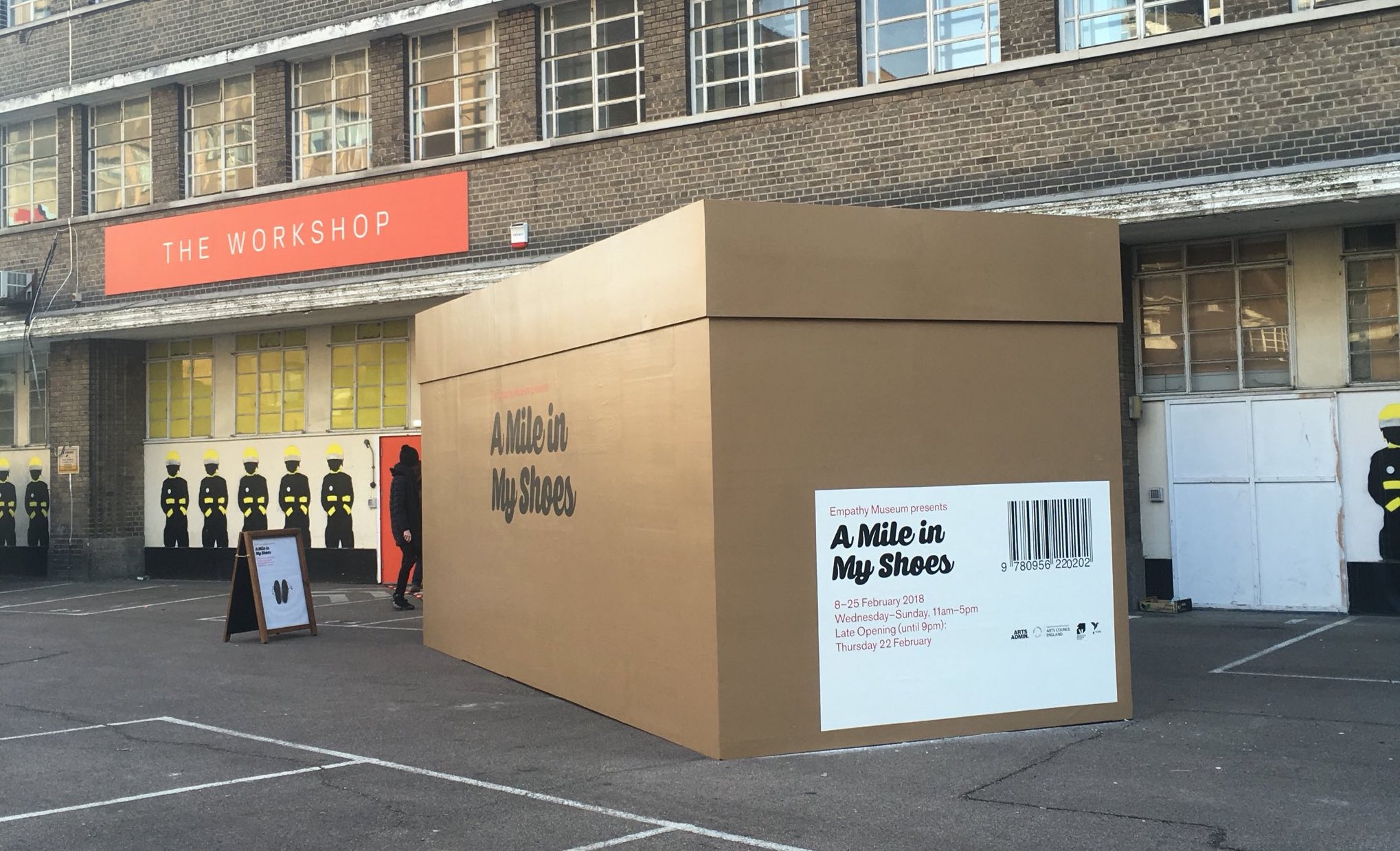
Empathy Museum presents: A Mile in My Shoes – Migration at the Migration Museum at The Workshop © Migration Museum
Held over 100 events, ranging from cookery classes to stand-up comedy nights, theatre performances to themed lates, sports tournament receptions and conversations with business leaders to our first ever Family History Day.
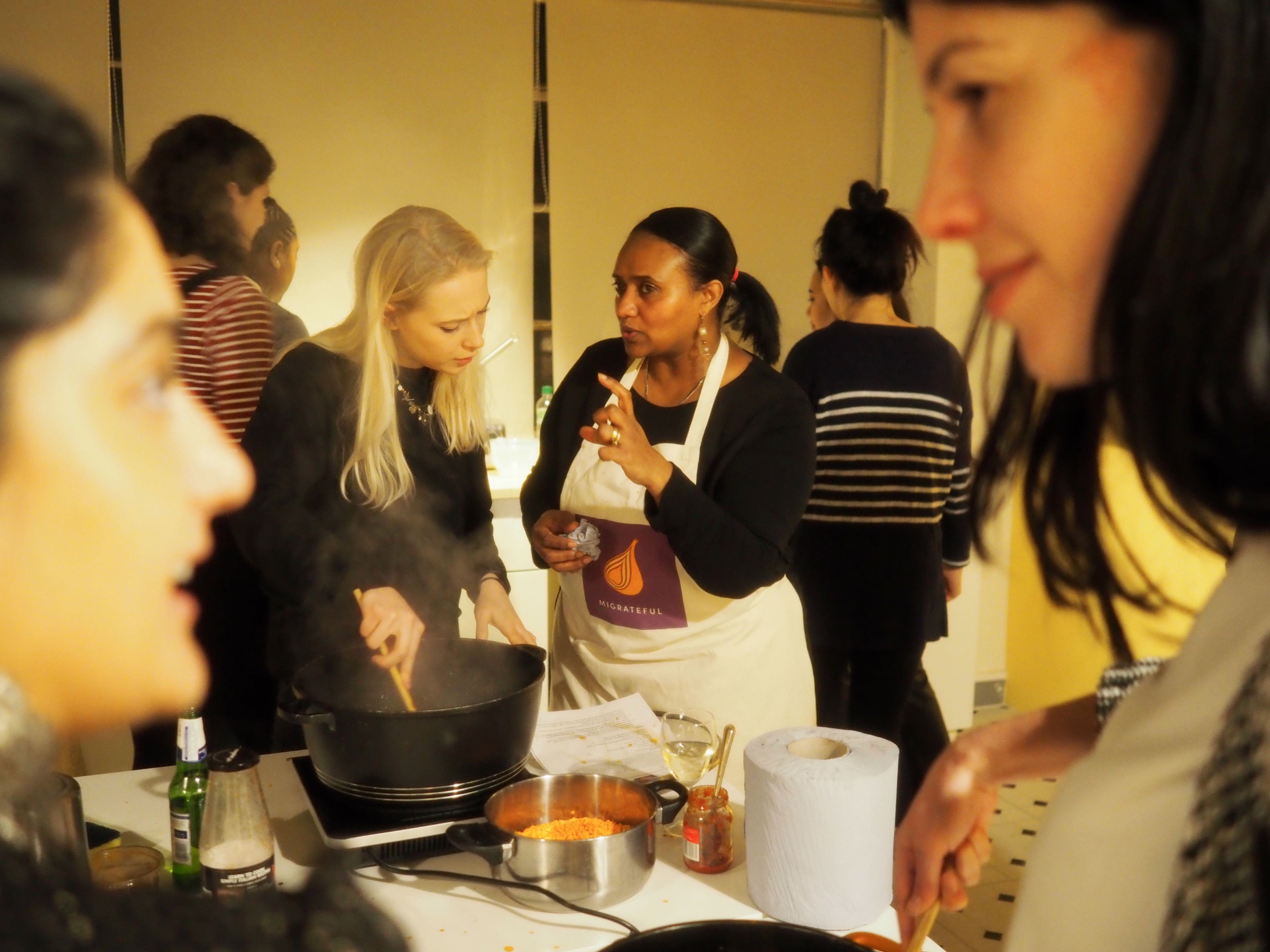
A Migrateful cookery class at the Migration Museum led by Woin, a migrant chef from Ethiopia © Tommy Walters/Migration Museum
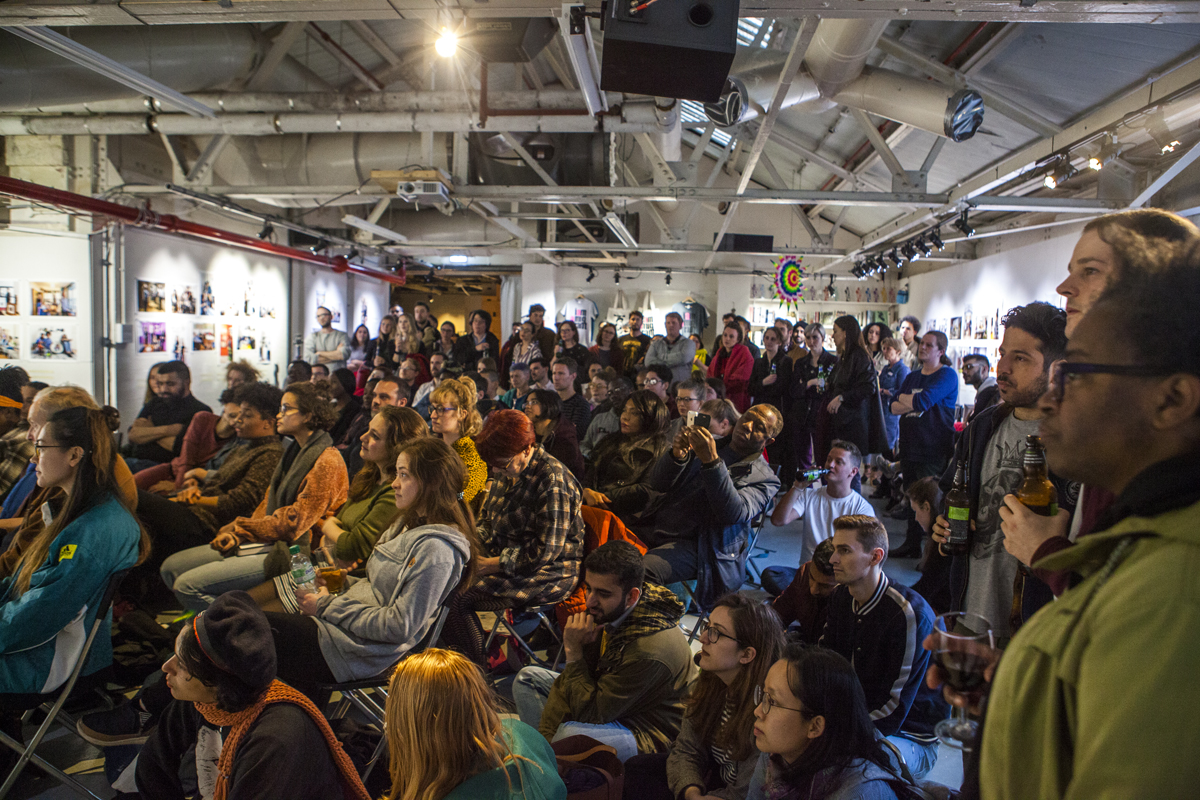
Audience members watch a performance at our Queer Migrations Late, April 2019 © Elzbieta Piakacz/Migration Museum
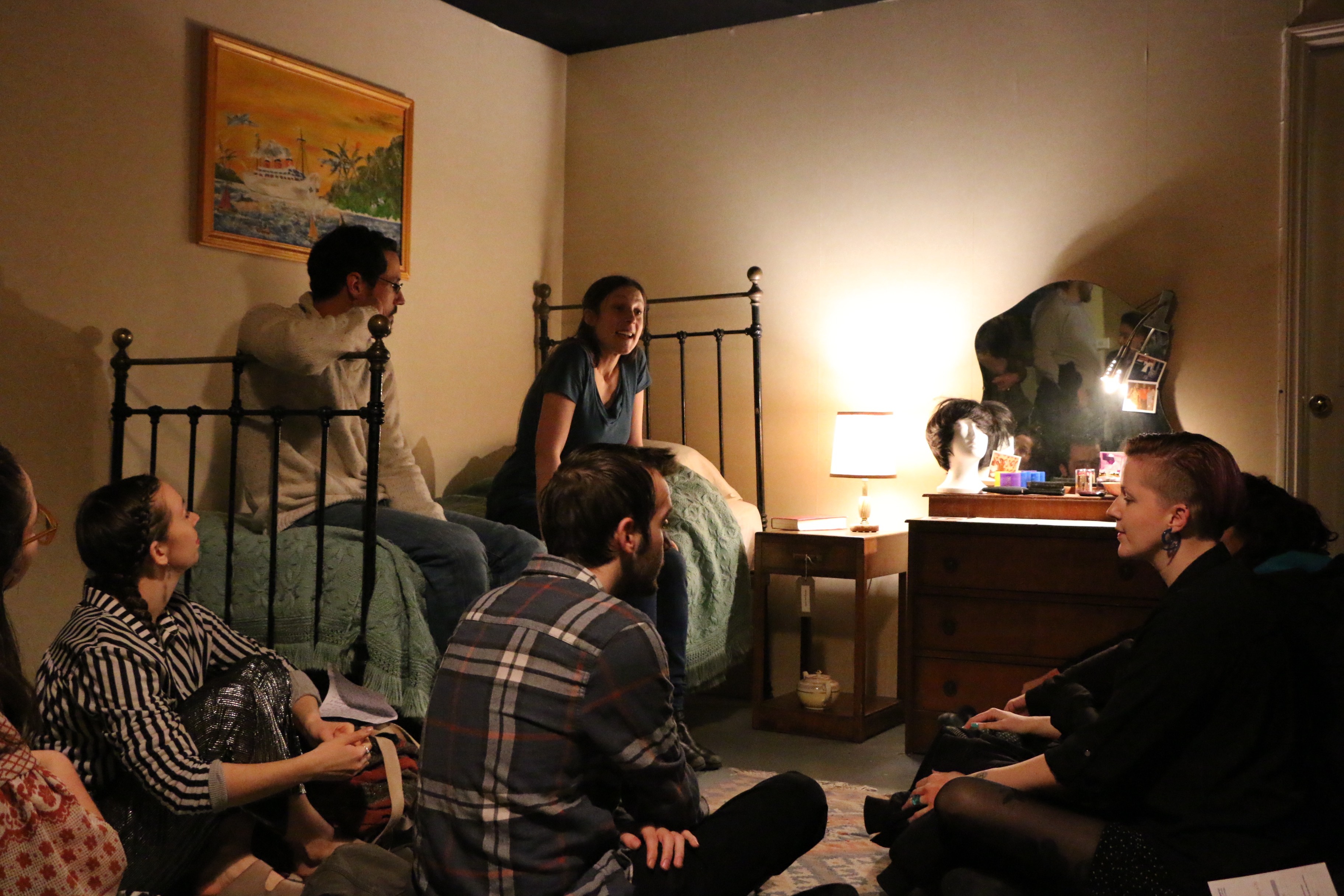
Touching Home, an immersive play by theatre company 27 Degrees, staged at the Migration Museum at The Workshop © 27 Degrees/Migration Museum
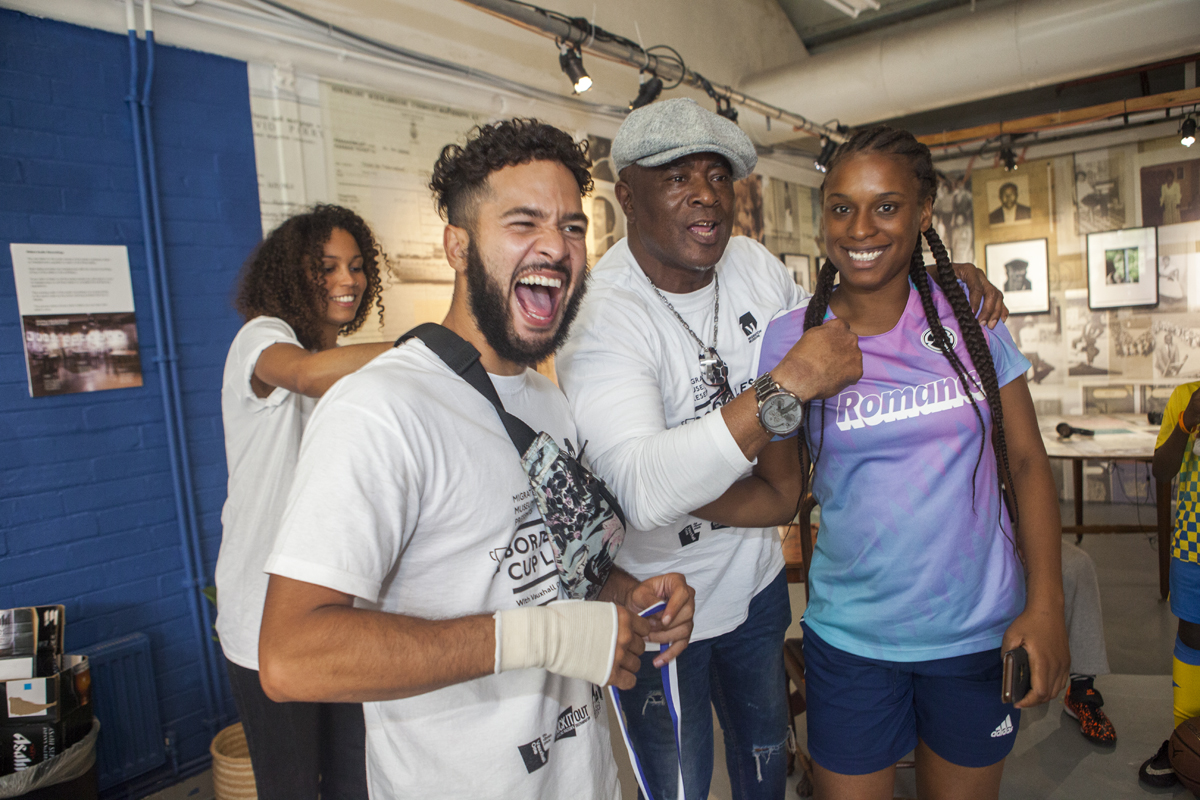
Paul Canoville, one of our distinguished friends, presents medals to participants in our Borderless Cup football and basketball tournament at the Migration Museum at The Workshop, August 2019 © Elzbieta Piakacz/Migration Museum
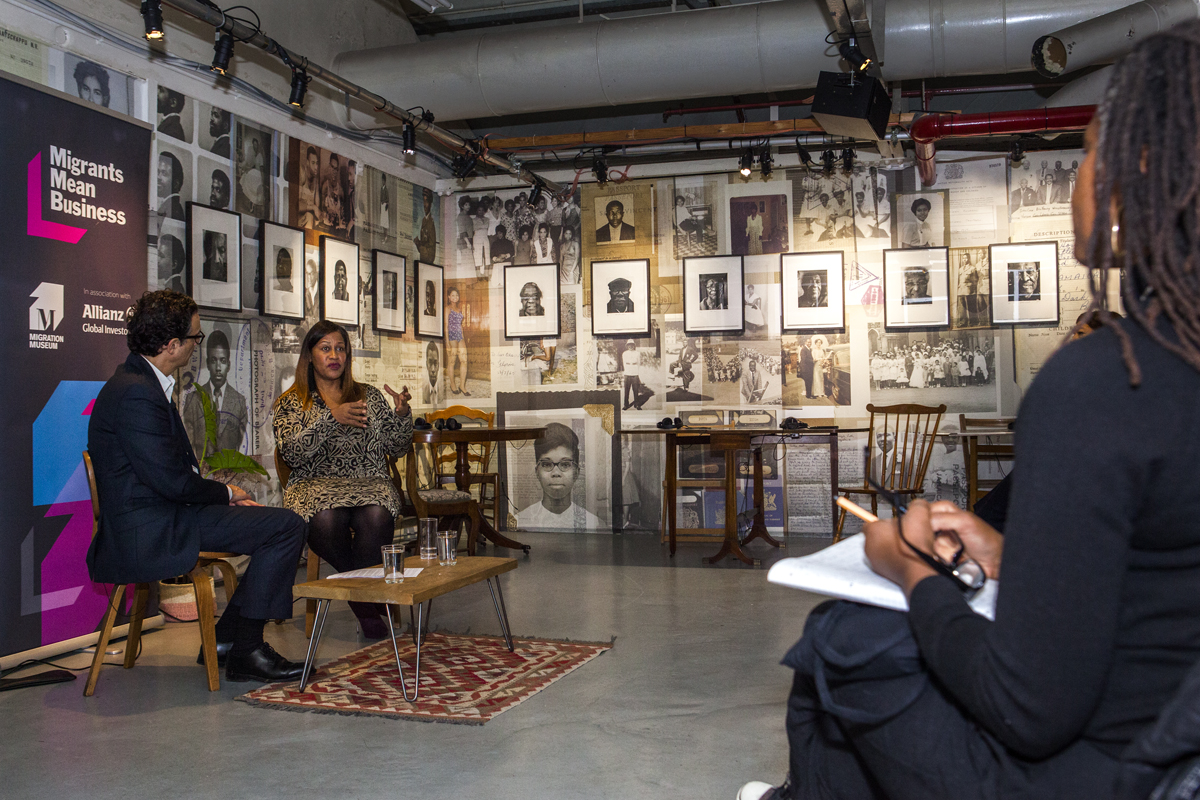
Karen Blackett in conversation with David Abraham as part of our Migrants Mean Business series of conversations with business leaders with migrant backgrounds, in association with Allianz Global Investors, November 2019 © Elzbieta Piakacz/Migration Museum
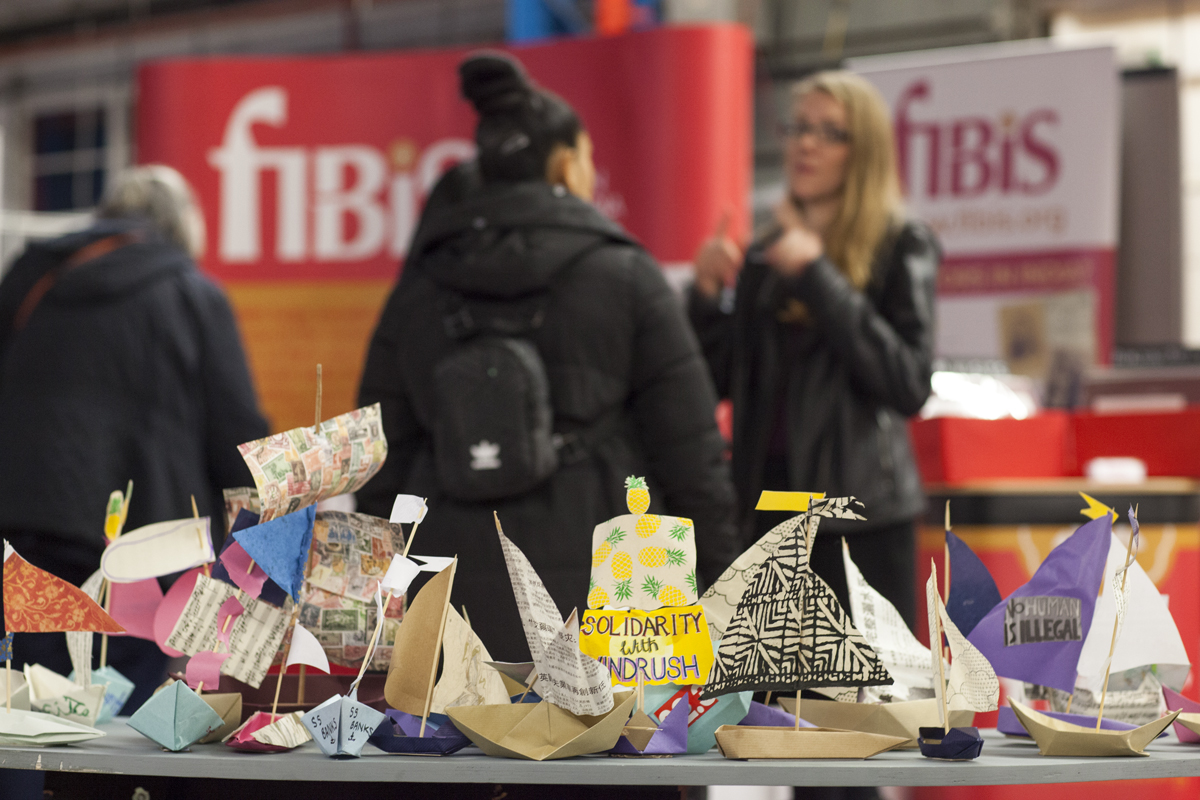
Family History Day at the Migration Museum at The Workshop, November 2019 © Elzbieta Piakacz/Migration Museum
Welcomed more than 5,000 primary and secondary school students, who took part in facilitated workshops and activities run by our learning team focused on the themes explored in our exhibitions and within relevant parts of the curriculum.
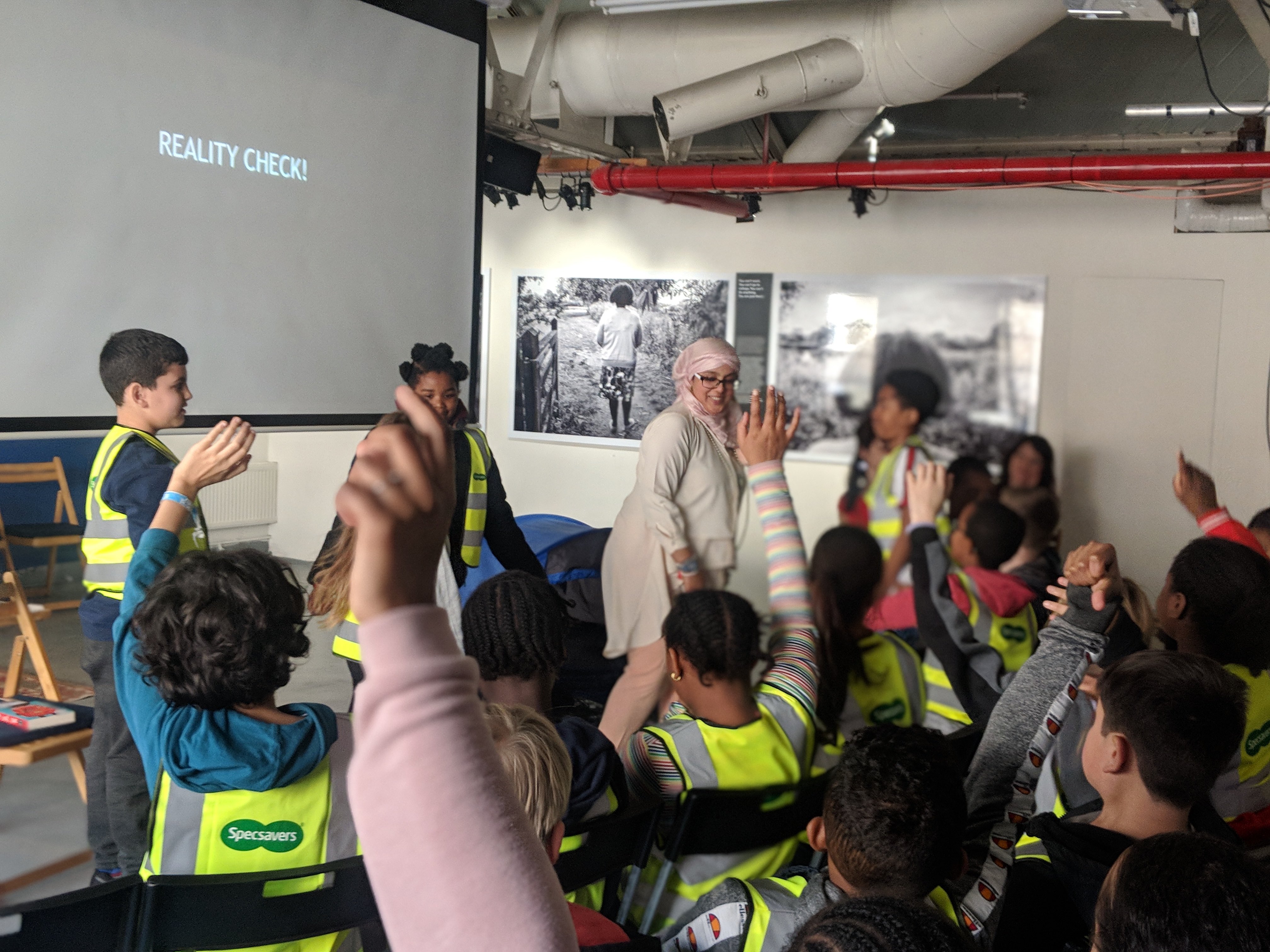
Students from Grafton Primary School participate in a workshop at the Migration Museum, March 2019 © Pop-up Projects
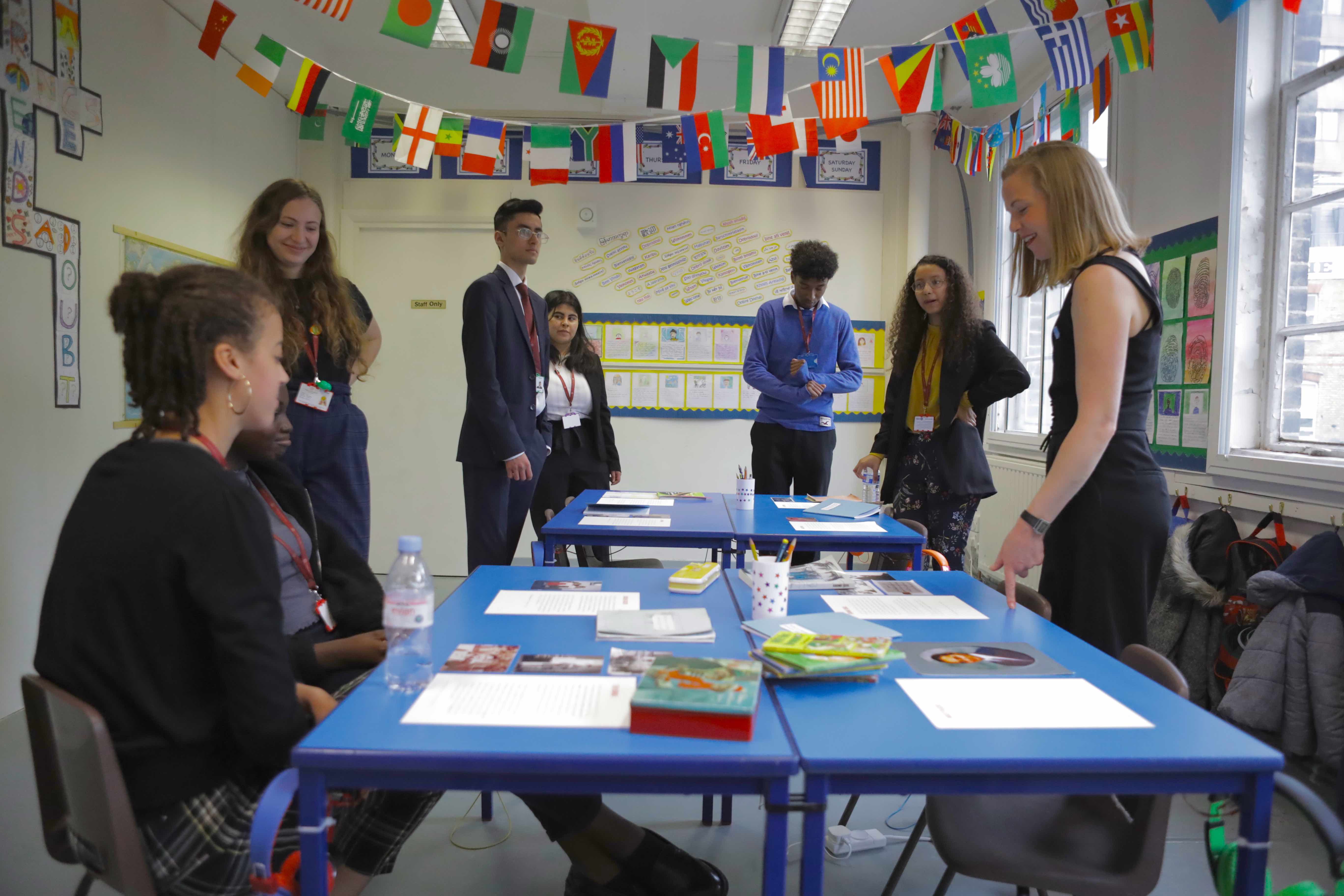
Students from Harris Westminster Sixth Form take part in a workshop in our Room to Breathe exhibition, June 2019 © Ufuk Gky/Migration Museum
Hosted more than 2,000 facilitated group visitors, ranging from community groups for older people to young refugees and asylum seekers, corporates and charities to government departments.
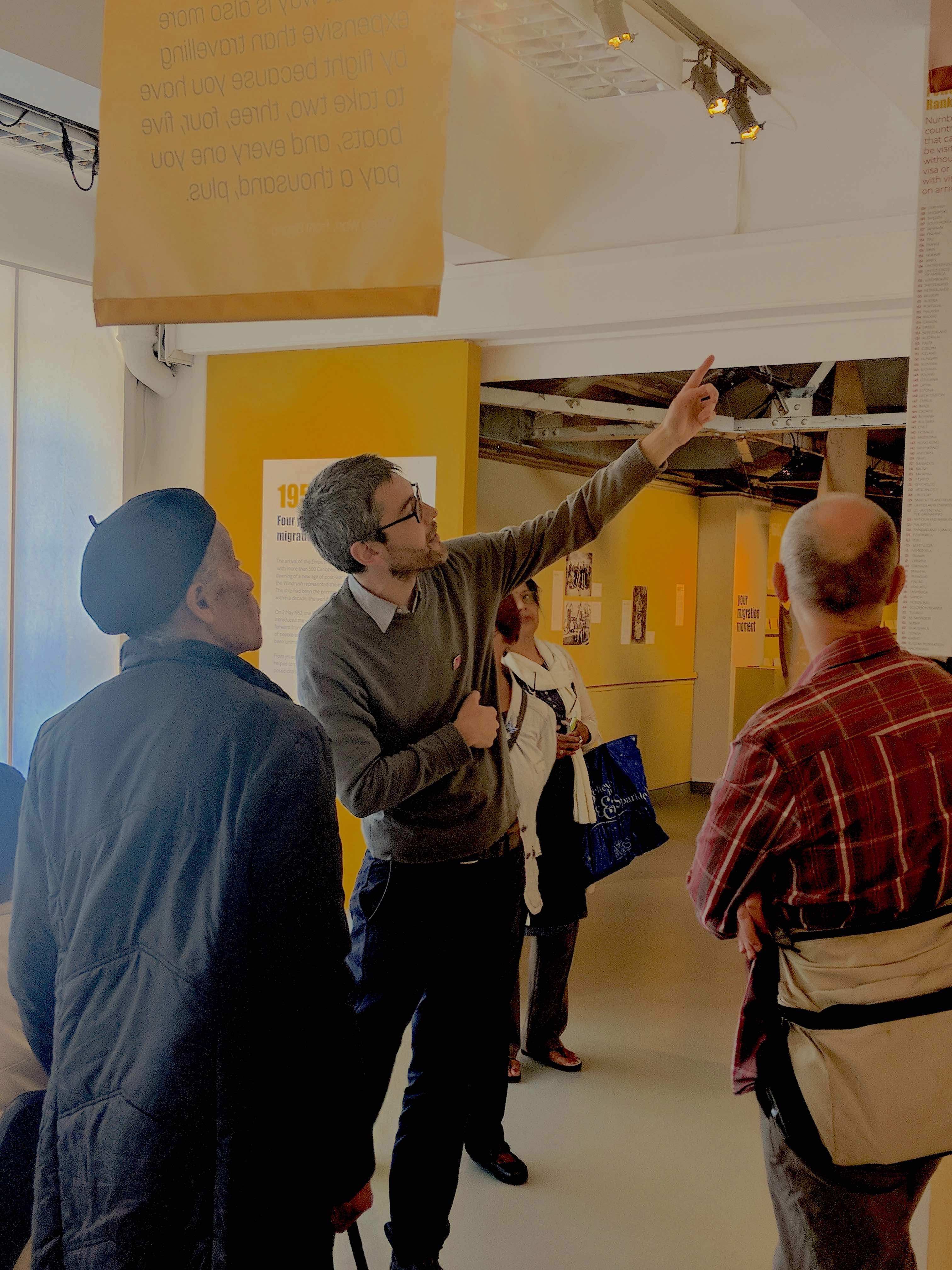
A guided tour of No Turning Back for a Tooting-based community group, 2018 © Migration Museum
Taken our activities out beyond the walls of the musuem into the local area through walking tours, sports tournaments, talks at schools, colleges and libraries and more.
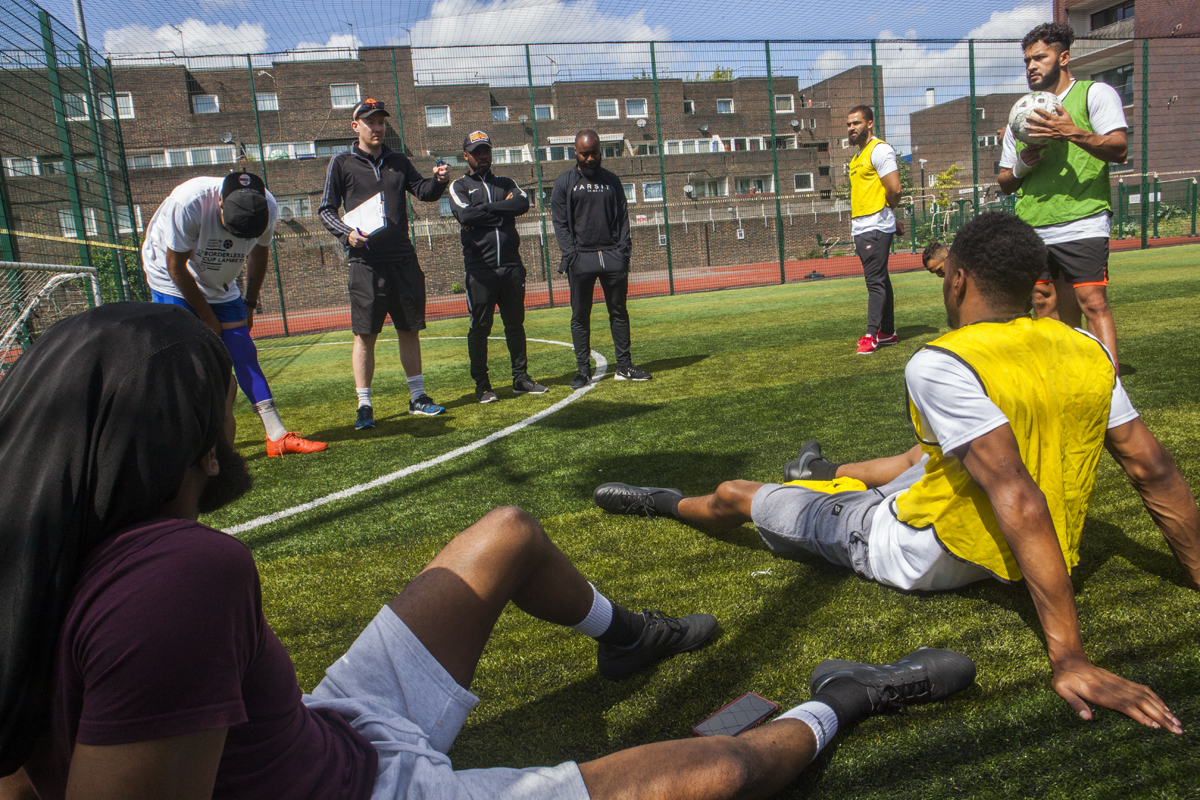
Participants in ourBorderless Cup Lambeth football and basketball tournament, August 2019 © Elzbieta Piakacz/Migration Museum
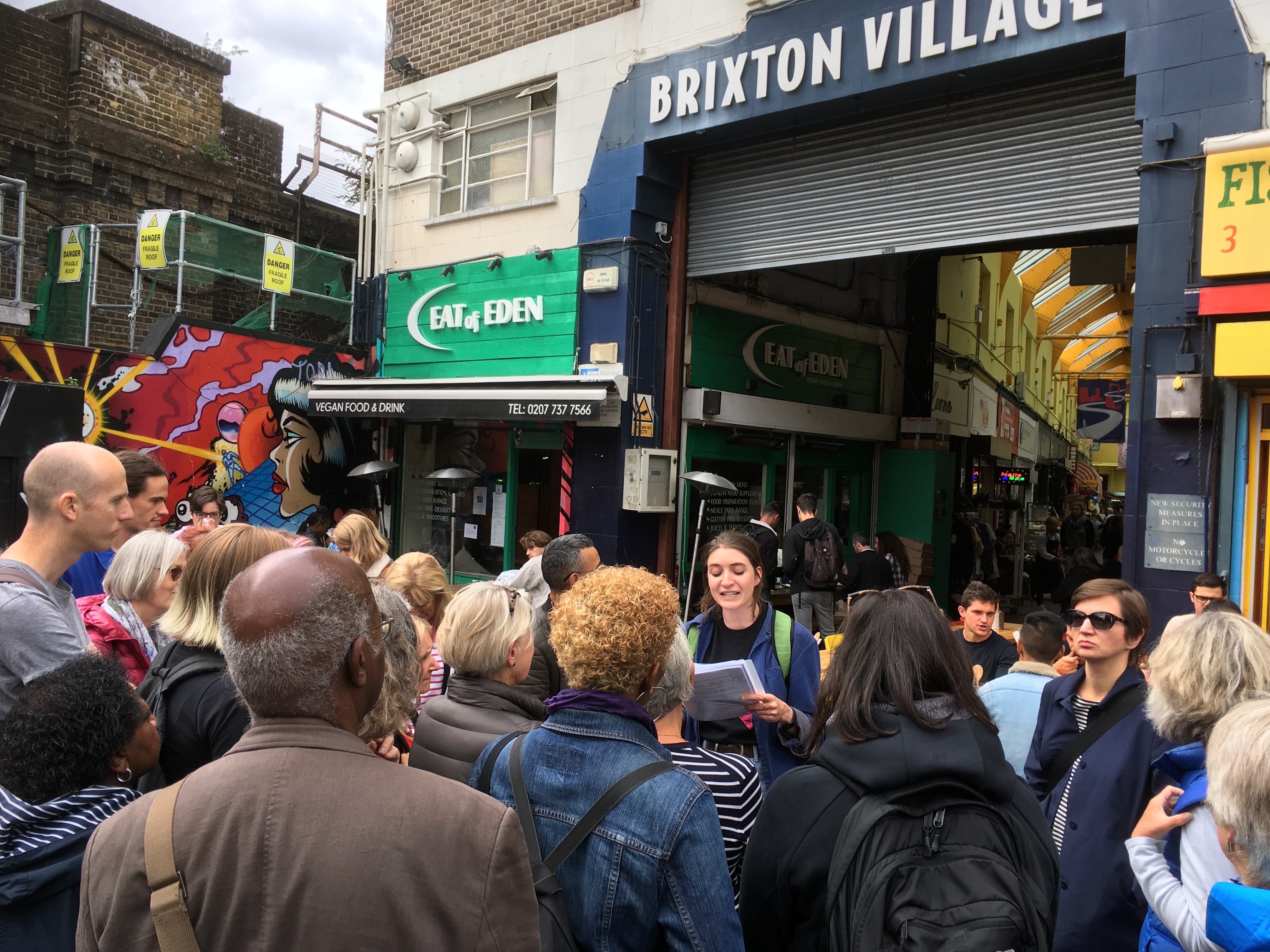
Our guided Lambeth Migration Walk, as part of the Lambeth Heritage Festival, September 2019 © Migration Museum
Thank you to everyone who visited us at The Workshop and to all of our contributors, funders and supporters.
We look forward to welcoming you to Lewisham in 2020!






























